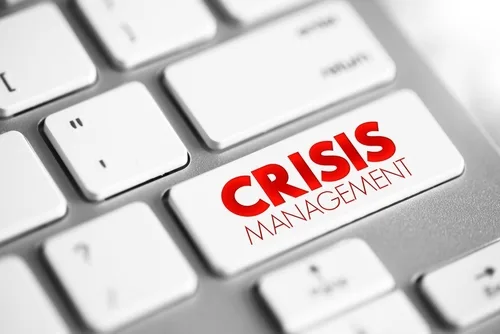Crisis Communication and Online Reputation Management: Responding To News Events

News travels faster than ever before. With just a few clicks and shares on social media, a story can go viral and reach millions of people within minutes. While this can benefit businesses in reaching a wider audience, it also comes with challenges. In today’s rapidly evolving media landscape, companies must be prepared to respond quickly and effectively to unexpected news events that could potentially impact their online reputation. It’s where crisis communication and online reputation management come into play. In this blog, we will learn more here the importance of a strong crisis communication strategy and how it ties into effective online reputation management during times of turmoil or negative publicity.
Introduction To Crisis Communication And Its Importance In Maintaining A Positive Online Reputation
Crisis communication is a critical aspect of any business or organization’s strategy. Maintaining a positive online reputation is paramount to success. From a negative tweet to a damaging news article, crises can sometimes arise and impact your business’s credibility and bottom line. An online reputation management and well-planned crisis communication strategy can minimize the impact of a crisis and even turn a potentially disastrous situation into an opportunity to demonstrate your organization’s strength and integrity.
A strong crisis communication plan includes clear messaging, timely and transparent communication, and a proactive approach to prevention and resolution. Don’t wait for a crisis to strike before thinking about your communication strategy – start building your plan today and protect your online presence for tomorrow.
Understanding The Impact Of News Events On Brand Image And How They Can Quickly Escalate Into A Crisis
News travels at lightning speed and can significantly impact a brand’s image. One news event can either bolster a company’s reputation or send it into a crisis. Businesses need to understand how news events can affect their brand image and take prompt action to mitigate potential negative consequences.
A company’s ability to respond effectively to a crisis can make all the difference in how the public perceives it and can shape its reputation for years. With social media and 24/7 news cycles, businesses must be vigilant and prepared to handle any potential crisis.
Case Studies Of Companies That Have Successfully Navigated Through Crises Using Effective Communication Strategies
Businesses face unprecedented crises from different fronts within our hyper-connected world. However, some seem to go through the rough waters much more adeptly than others. So, what sets these organizations apart? If you delve into the stories of companies that have survived tough times, you’ll find they all had one common trait – a strong communication strategy.
Whether it was Johnson & Johnson’s swift response to the Tylenol poisoning incident or Starbucks’ heartfelt apology after a racial incident in one of its stores, these companies communicated quickly, transparently, and authentically with their stakeholders, employees, and customers. The result was that they bounced back and emerged stronger than ever before. Effective communication, it seems, is the linchpin of crisis management.
The Role Of Social Media In Crisis Communication And Tips For Managing Negative Comments And Backlash
Social media has become a critical tool for crisis communication. Companies and organizations can leverage platforms like Twitter, Facebook, and Instagram to respond quickly and effectively to emergencies and disasters. However, with the power of social media comes the potential for negative feedback and backlash. These comments can spread quickly and harm a company’s reputation. It is crucial to have a well-defined crisis communication plan in place to manage negative comments and backlash. This plan should include monitoring social media platforms and responding quickly and transparently to negative comments.
Emphasizing transparency and honesty can help build trust and credibility with your audience during a crisis. Additionally, it’s essential to have designated spokespersons who can speak on behalf of the company and stay consistent with messaging. By having a solid crisis communication plan, companies can effectively navigate negative comments and protect their reputation while using social media to their advantage.
 Importance Of Having A Designated Spokesperson And Developing A Crisis Communication Plan Beforehand
Importance Of Having A Designated Spokesperson And Developing A Crisis Communication Plan Beforehand
When a crisis hits, time is of the essence. To respond quickly and effectively, it’s essential for organizations to not only have a well-planned crisis communication strategy but also to have a designated spokesperson to deliver the message. The right person can help ensure that facts are communicated accurately, the organization’s values and reputation are protected, and the right tone is struck in messages.
By having a strong plan in place and a clear understanding of who will be responsible for communicating with all stakeholders, businesses can help mitigate the risks of a crisis and emerge from it with their brand and reputation intact. So, organizations should never underestimate the importance of a designated spokesperson and developing a crisis communication plan ahead of time.
Creating Authentic And Transparent Messaging During A Crisis To Maintain Trust With Stakeholders
During a crisis, businesses and organizations must maintain trust with their stakeholders. One of the most important ways to do this is through authentic and transparent online messaging. In times of uncertainty, stakeholders need to feel informed and reassured. Being honest about the situation, acknowledging mistakes, and providing regular updates can make a huge difference in maintaining trust.
It means communicating openly and candidly, even if it means admitting to some difficulties or challenges. Through genuine messaging, organizations can build crucial bonds with their stakeholders, ultimately helping to weather the crisis storm and emerge stronger on the other side.
Utilizing Online Tools Such As Google Alerts To Monitor Any Potential Issues Or Negative Publicity
Being proactive when managing your brand’s online reputation is more important than ever. Using online tools like Google Alerts can make the process much easier. You’ll be notified whenever your brand is mentioned online by setting up alerts for your company name or relevant keywords.
You can easily keep tabs on your reputation and quickly address any negative comments or issues before they escalate. Plus, Google Alerts are free, making them a cost-effective way to stay on top of your online presence. So why not use this powerful tool to protect your brand’s reputation online?
Responding Promptly And Effectively To News Events, Including Acknowledging Mistakes And Providing Solutions
Staying abreast of current affairs in today’s 24-hour online news cycle can be daunting. With so much information at our fingertips, businesses must respond quickly and effectively to news events that could impact their brand image. It means acknowledging any mistakes that may have been made and providing solutions on time.
In a world where public perception can make or break a company, it’s crucial to prioritize transparency and accountability regarding crisis management. By effectively addressing any issues that arise in the news, businesses can build trust with their stakeholders and maintain a strong reputation in the long run.
Tips For Repairing A Damaged Online Reputation After A Crisis Has Occurred
Your online reputation is just as important as your reputation in real life. Unfortunately, a crisis can strike at any moment and cause damage to your online image. The good news is that with the right approach, you can repair it. One important tip is to address the issue head-on and take responsibility for any mistakes. Being transparent and open with your audience about your efforts to make things right is crucial.
Additionally, actively engaging with your audience through social media and other channels can help build trust and repair any damage done. Remember, an online reputation takes time to build but can be repaired after a crisis with patience and a proactive approach.
Conclusion
In conclusion, as we have seen throughout this blog post, effective crisis communication is vital for maintaining a positive online reputation. Companies must be prepared with a well-structured plan to handle unforeseen events proactively. By being transparent, responsive, and authentic in their messaging during times of crisis, companies can mitigate damage to their brand image and reputation. So, let’s take this opportunity to be proactive and maximize our efforts in managing our online reputation. Together, we can weather any storm and come out stronger on the other side.






